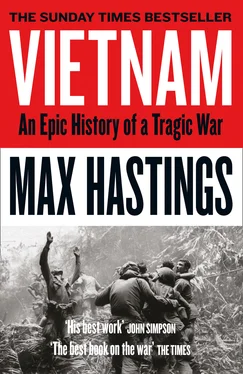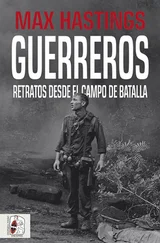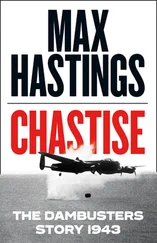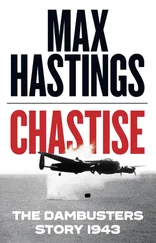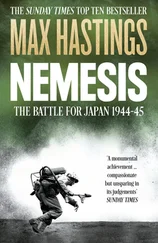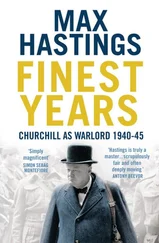They all had adventures, which of course was what most were seeking. Though Frank Scotton was a civilian, he indulged a passion for roaming the countryside, often alone but always armed, in search of action as well as knowledge. This practice led him into situations unexpected for an information agency staffer. One morning during his early wanderings in the Central Highlands, he saw approaching a man with a slung weapon: ‘I would have been relieved had he not seen me and simply passed by. But he pulled his rifle forward and raised it while still looking as surprised as I felt myself. I was the quicker for having my carbine chambered and off safety. We were so close that I could not miss. Aiming is as simple as pointing your finger, extension of intention. If something must be done, make sure it is done. I fired several times. I felt no guilt afterwards, but some deep remorse that two strangers would meet by a hillside and one lose his life.’
On another occasion Scotton was moving across country with a young tribesman guiding him. As the light faded at evening, they saw two armed men strolling carelessly towards them. The American’s companion sprang forward and dispatched the rearmost guerrilla with a knife thrust in the back. As the other turned to raise his rifle, Scotton shot him several times. The montagnard dragged the corpse of his own victim to a trail intersection and sat him upright, apparently gazing back whence he had come. Scotton asked his companion, who spoke some French, why he did this. The man shrugged, ‘ C’est la guerre psychologique! ’
Throughout the Kennedy years there was an ongoing debate in Washington about whether the US should go much further than its advisory and support commitment – start deploying major combat units. Gen. Maxwell Taylor was among those who, before recanting when he learned a little, favoured an increased troop commitment: ‘South Vietnam is not an excessively difficult or unpleasant place to operate … North Vietnam is extremely vulnerable to conventional bombing … There is no case for fearing a mass onslaught of Communist manpower into South Vietnam and its neighbouring states, particularly if our airpower is allowed a free hand.’ As a military man, Taylor viewed the conflict as a military problem. He recommended dispatching at least eight thousand logistical personnel.
Secretary of state Dean Rusk and defense secretary Robert McNamara dissented: neither thought that a small commitment would achieve enough to justify the political cost. The Pentagon calculated that to see off South Vietnam’s communists, 205,000 American troops would be required. Some of the young diplomats who had accompanied Taylor on his visit to Vietnam not merely opposed the general’s recommendation for troops, but thought the Diem regime unsustainable. Memories of the World War II experience hung heavy over strategy-making. Its foremost lesson seemed to be that overwhelming might was irresistible. Greg Daddis has written: ‘The one common failing of most military officers and senior civilian officials … was their faith that military power, broadly defined, could achieve political objectives in post-colonial states.’ Possession of armed might can be corrupting: it feeds an itch among those exercising political authority to put it to practical use. Successive Washington administrations have been seduced by the readiness with which they can order a deployment, and see this promptly executed. It is much easier to commit armed forces, especially air power, in pursuit of an objective than to grapple the complexities of social and cultural engagement with an alien people.
In 1961 and indeed thereafter, there was an insensitivity among policy-makers about the impact that a Western military presence makes. Many harsh things may justly be said about what communist fighters did to Vietnam, but their footprint on the ground was light as a feather by comparison with that made by the boots of the US military. The very presence of affluent Westerners, armed or unarmed, uniformed or otherwise, could not fail to exercise a polluting influence on a predominantly rural and impoverished Asian society. Like other senior Americans posted to Saigon, the CIA’s Bill Colby adopted a domestic style befitting an imperial proconsul, occupying a villa with a domestic staff of six. Army enlisted men took it for granted that a Vietnamese cleaned their boots and policed their huts.
By contrast, one of the perceived virtues of the enemy was that they had so little save their guns. Again and again, peasants were heard to say that, whatever else was wrong with the communists, they were not getting rich. Western wealth and technology did not generate envy among poor Vietnamese; it merely emphasised a remoteness, an alienation from their enormous foreign visitors, that no amount of MEDCAP visits, inoculations, food aid, tractors, outboard motors, ‘miracle’ rice could assuage. Material aid never secured the gratitude its donors hoped for. Children visiting Saigon zoo often likened the apes to Americans, because both had such long, hairy arms. Some older Vietnamese were uncomfortable with black soldiers, who awakened memories of France’s exceptionally brutal colonial units. Local cynics, as well as communist propagandists, asserted that Washington shipped to Indochina only commodities discarded by Americans, such as hated bulgur wheat.
A West Point adviser could scarcely fail to regard with disdain a forty-seven-year-old battalion commander with blackened teeth, alongside whom he was assigned to service without any common language. An ARVN officer wrote: ‘No superior anticipated or taught the young [American] captain to adapt to our situation and cultural environment. He would make ridiculous intrigues to control his Vietnamese counterparts and take control of the battalion, as if it was his toy.’ After a year, before he went home, the American told his counterpart that he was now starting to understand the war, and regretted his earlier crassness. But then he boarded his plane, another adviser came, and the cycle restarted. ‘That is the history of advisors. American people have goodwill, but they are impatient.’ A Vietnamese officer trainee cited the sort of cultural clash an American might precipitate: at Dalat military academy, a US Army captain tapped on a cadet’s helmet with his briefing stick, to awaken him from a doze. This gesture almost provoked a riot prompted by the shared fury it aroused among the Vietnamese, for whom even a token blow signalled colonial contempt. That confrontation was eventually defused by the school commandant, Col. Nguyen Van Thieu, later Vietnam’s president.
Chuck Allen’s special forces A Team, out at Khe Sanh in the winter of 1962, referred to their Vietnamese counterparts as ‘LLDB’ – Lousy Little Dirty Bastards: ‘It could be hard to get [them] out on an operation. They didn’t want to leave the camp. Sometimes we had to bribe them with extra food or clothing.’ Patrolling Americans were exasperated by ‘accidental’ discharges of weapons to cause bangs to push away the VC, or wilfully tall plumes of smoke from cooking fires. ‘It takes a while to learn that the American way isn’t always the right way … In Vietnam, the poor bastards had been at war for fifteen years. And here we come, full of piss and vinegar, wanting to win in six months.’ That A Team nonetheless felt good about its own little corner of the action, singing a song that a host of Americans would reprise before it was all over: ‘We were winning where we were.’
Yet the vast majority of the three million Americans who eventually served in the country departed without holding any more meaningful intercourse with its inhabitants than a haggle about the price of sex. It was inevitable that US forces should require access to ersatz-American facilities when serving in a faraway country – so do all foreign armies in such circumstances. Even the correspondents who reported the war took for granted their privilege of receiving sanctuary in American messes to write dispatches often savagely critical of American failings. But the manner in which most of Kennedy’s crusaders lived apart from the Vietnamese, save when orchestrating violence, was a formula for alienation.
Читать дальше
